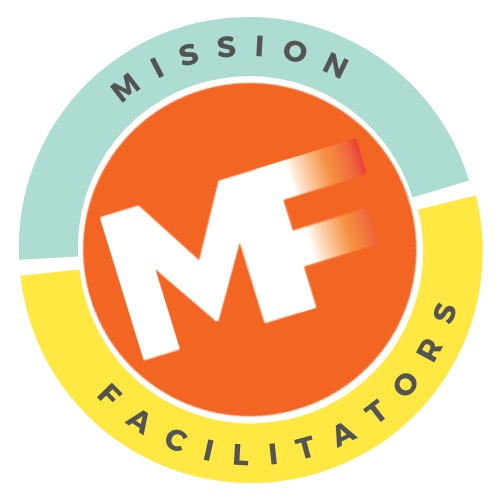How to Tap Into the Whole Person
OUR BIGGEST CHALLENGE today is not health care, poverty, political divisiveness or even climate change: our biggest challenge is within ourselves, getting out of our own way, finding and trusting our authentic intuitive voice. For all challenges and growth start within each of us, individually.
I realize that’s a pretty bold statement. Let me back up a bit and tell you how I derived at that conclusion:
I’ve always known, even as a kid, that most problems and challenges present themselves as symptoms and that real transformation starts when you peel back the onion and find the truth.
So after college and a stint with acting and teaching, I started my training and development firm using age-old wisdom, modern-day learning models, neuroscience, theater, and storytelling, in order to help leaders and teams get past their blind spots and symptoms to discover their truth and their mission; hence the name of our company, Mission Facilitators International. And that approach worked. We have helped increase employee engagement, create high-performing teams, and cultivate leaders with our executive coaching, leadership development, strategic planning, and culture change work.
But, there was something missing. Something important.
Then in the spring of 2019, I got an opportunity to speak at a TEDX event in Bend Oregon. I was assigned a coach, and she kept pushing me to go deeper. My topic about getting to truth and purpose was OK, but it wasn’t an idea worth spreading.
After weeks of thinking, writing, and re-writing, I discovered 2 things: 1, (that bold statement I told you about earlier) that our biggest challenge is not outside of us, but inside. And that real transformation had to start with us before we could effect change with others, our families, teams, companies, and even the planet.
And 2: The key is intuition. For when we have the courage to trust our intuition, we make better decisions by accessing vast amounts of information and experience, we forge real connections with one another by deeply listening, and we creatively solve our biggest challenges by seeing problems from different perspectives. The title of my talk became: Why the world needs intuition now more than ever.
Once I had the topic for my TED talk, I needed to back it up with examples and stories. So I shared:
- How the 1986 Challenger explosion might have been prevented had top management valued the “hunches and concerns” by key engineers,
- Steve Jobs said in his biography, “… an intuitive understanding was more significant that logical analysis,
- That the most important leadership lesson ever learned by Warren Bennis was listening to his “inner voice,
- ”How Oprah once said, “I’ve trusted my intuition my entire life. The only time I’ve made a mistake is when I didn’t.”
- I talked about a Harvard Business Review article that said the higher up you go in an organization the more important intuition becomes because it makes executives better listeners, decision-makers and problem solvers,
- I referenced the New Jersey Institute of Technology that studied the relationship between intuition and business success, and found that 80 percent of executives whose companies’ profits had more than doubled in the past five years had above average intuition skills,
- And I used the example that employees who keep quiet in overconfident organizations can create company-wide blind spots – with devastating results. Blockbuster had the option to buy Netflix but passed, and now in Bend Oregon, stands its last store.
I even shared some personal stories of when I did and did not follow my intuition with both successful and devastating results.
By the time I gave my talk I was hooked on the idea that we all possess a superpower called intuition.
I also knew I wanted to keep the discussion going, hence this podcast, The Business of Intuition.
So, onto this podcast:
Each episode provides the best strategies and insights from business leaders, scientists, entrepreneurs, artists, coaches, futurists, educators, and authors that show listeners how to amplify their impact.
This podcast was designed for:
- The CEO or business owner who wants to:
a. Create a forward-thinking culture,
b. Develop an actionable vision,
c. Improve employee engagement. - It’s for the Human Resource leader who wants to:
a. Create a space for innovation,
b. Promote diversity and inclusion,
c. Release the full potential of employees. - It’s for the Team Leader who wants to:
a. Nurture the development of their team,
b. Find more time to lead and less being in the weeds,
c. Improve communication. - And it’s for the general public who wants to:
a. Launch rapid transformation,
b. Learn new tools,
c. Make deeper connections.
Last year I was at a conference and one of the speakers said something that has stayed with me ever since. David Houle, a futurist who wrote “Shift Happens” said:
“The speed of change right now is the slowest it will be for the rest of our lives.”
If you are paying attention to what is happening in the world, that comment from David seems right.
So my thinking is this: In order to keep up with this pace of change, we need to recognize patterns faster, deepen collaboration and accelerate learning. We need CEO’s, Team Leaders, HR Directors, Teachers, and Parents to encourage intuition, so everyone feels safe enough to point out issues and share untested creative ideas.
Each episode of the Business of Intuition will last approximately 30 minutes and will be published once per week. The format is fun, upbeat, and very conversational.
So, I’ll leave you now with a great quote from Albert Einstein:
“The intuitive mind is a sacred gift and the rational mind is a faithful servant.
We have created a society that honors the servant and has forgotten the gift.”
My name is Dean Newlund. I hope you’ll join me for The Business of Intuition, and to have the courage to remember your gift.
“If you keep trying to solve the problem the same way you have and you failed, you’re just going to repeat history.”
– Bill George

